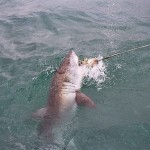 MICHIGAN (USA)- Traditionally, sharks are portrayed in a negative way in media coverage. More than 52 percent of global coverage focuses on shark attacks, and in 60 percent of coverage, sharks are portrayed negatively.
MICHIGAN (USA)- Traditionally, sharks are portrayed in a negative way in media coverage. More than 52 percent of global coverage focuses on shark attacks, and in 60 percent of coverage, sharks are portrayed negatively.
A new study from Michigan State University reveals that this negative image is affecting their survival.
Negative effects
Compared to a tiny 10 percent coverage featuring shark conservation efforts and 7 percent focusing on shark biology and ecology, these numbers are disproportionate.
Another strange factor the study revealed is that conservation groups are typically quoted or cited highlighting the negative effects on sharks, but not in stories about shark conservation.
The findings of this study, published in the current issue of Conservation Biology, reviewed worldwide media coverage of sharks and found that the majority isn’t good. According to the study, allowing such articles to dominate the media coverage diverts attention from key issues.
And there are many issues that are more urgent, such as shark survival, including the threat of overfishing, pollution, habitat loss and climate change. Sharks’ slow-growth rates, late age of maturity, long gestation periods and low reproductive output make shark populations especially vulnerable.
Read more at Red Orbit
